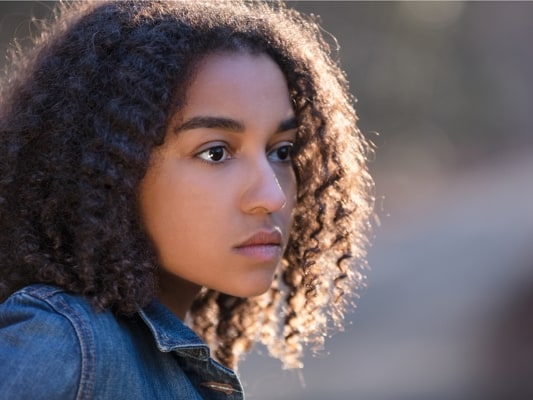
How FGM affected Amina’s life
Amina* underwent FGM/C as a young girl. As an unmarried woman, she is torn between trying to value her culture and the pain she had to endure.
I was only six years old, and my sister was four. I remember us playing and my aunt walking in. She pinched our cheeks, smiled and said, ‘tomorrow is a big day for you girls.’
I had no idea what she meant. All we cared about was fun and games. Then my mother reiterated what my aunt said, ‘tomorrow you become women.’
I didn’t know how to respond; I just looked at my mother’s beaming eyes and smiled. It sounded like something great was in store. I started getting excited about it. My sister and I just couldn’t wait for this mystery treat.
Mum woke us up and dressed us early, as always. Our aunt was bright-eyed and singing as she held our hands. Mum said they were taking us to see a special lady who was going to make us women. My sister and I exchanged toothy smiles; the suspense was making us all giddy on the inside.
My aunt held our hands and ushered us into the house of an old woman. The woman spoke to us warmly, but there was something about her look that was a bit eerie. At this point Mum and Aunty and other women were singing; music filled the air.
I went in first. The lady asked me to lie down. I lay on my back and with a single swoop my panties were off, my legs were spread and I felt a part of me I had never felt before. I came to discover it was my clitoris; it was being yanked. I felt a piercing pain. I screamed calling for my Mama, squirming as the woman tried to keep me calm. Mama and all the other women singing had gone.
After the cutting came the stitching. I was in so much pain I almost passed out.
We were left alone in this woman’s home where she cared for us, treating our wounds and managing the bleeding. Peeing was painful for what seemed a lifetime. It took a month or two for us to heal. We weren’t alone; there were other young girls with us. Moving was so hard, and so uncomfortable. It was difficult to understand why this had happened.
I am in my 20’s now, and I feel a sense of shame talking about it and reliving that day. Yet at the same time I understand that female genital cutting, also known as Female Genital Mutilation (FGM), is our tradition.
It is what will make me a worthy wife. Or so I have been raised to believe.
I am torn. It is wrong, the act is wrong. It hurts us and it’s dangerous and I do have concerns about the day I will have my first sexual encounter with my husband.
But at the same time, this is what has been passed on by generations. I don’t want my daughters having to go through this. But when I cease to do this, what will I pass on to them from my ancestors as an important message and path for womanhood? I really don’t know.
*Amina is not her real name
If you were in Amina’s position, what would you do? Leave a comment below.

i see that now days people
i see that now days people have developed, and we r nolonger in the african traditional society, it has become amordern world. and that thing they cut, God created it there i dont see the reason as to why you remove them!!! so am against it. my friend dont let that pain come back to your daughters.
Thanks for your input Mercy.
Thanks for your input Mercy.
I can only imagine how you
I can only imagine how you feel right now or even since this thing happened but I believe the best thing for you to do is move ahead with the determination to never allow it happen to your own children and many others that don’t even have a platform like this to come out; somethings happen for a reason. Find yours and run with it.
Thanks for your input Miracle
Thanks for your input Miracle.
Be strong and dont let it
Be strong and dont let it ruin ur future, b/c no matter what had happened,ur are special. Dont forget that.
Thanks for your input.
Thanks for your input.
I think this is one of the
I think this is one of the bad practices we should campaign against, not only is it demeaning to the pe rsons involved, it also predisposes them to STDs , low self esteem… hence it should be discontinued because its risks outweighs its benefits.
Thanks for your input
Thanks for your input Winifred.